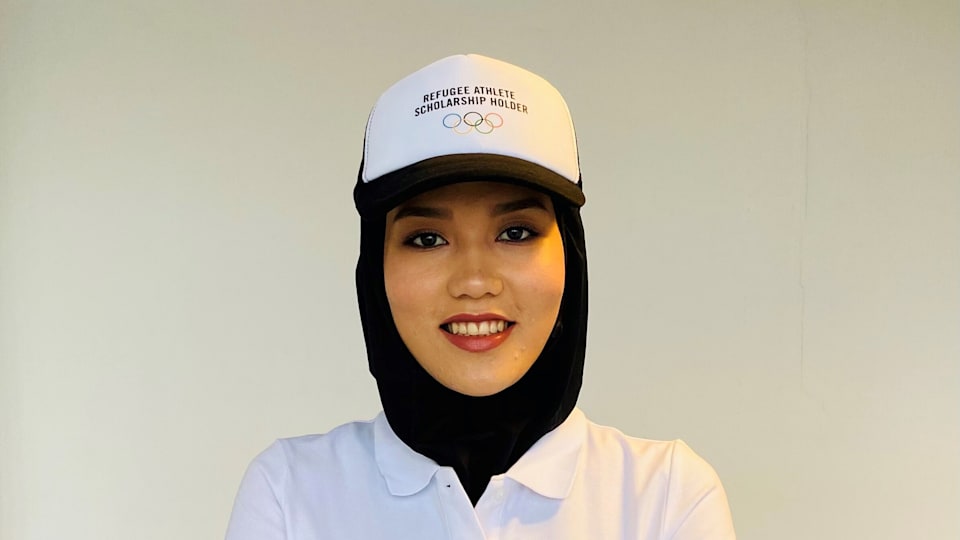Masomah Ali Zada: Refugee cyclist and symbol of solidarity for women everywhere
Pushed off her bike, taunted and abused on the road, Masomah Ali Zada fled Afghanistan for a safer life. Now a proud member of the IOC Refugee Olympic team at Tokyo 2020, Ali Zada is cycling for freedom and choice.

“I would like to show I exist.”
The defiant request of a woman who is all too aware that just by living her life as she chooses, she is resisting those that would see her cease to be.
Masomah Ali Zada is a refugee road cyclist.
Originally from Afghanistan, Masomah and her family found asylum in France after a documentary “Les Petit Reines de Kaboul” revealed the prejudice she, and her cycling teammates, encountered while out on the roads in their native country.
The remarkable resilience of a group of young Afghan women defying their patriarchal society moved French lawyer Patrick Communal to intervene. He organised the relocation of Masomah and her family away from Kabul so that she and her sister, Zahra, could live their lives the way they wanted in safety.
Now, with thanks to the IOC Refugee Athlete Scholarship holder scheme, she is also an Olympian.
It is the realisation of a dream never thought possible, not least while Ali Zada was threatened, taunted, and physically abused from the seat of her bike in Afghanistan.
Under the rule of the ultra-conservative Taliban, women like Ali Zada were never meant to ride bicycles.
Even children in the streets would heckle the young Afghan as she and her fellow female cyclists rode by. Speaking to Olympics.com she explained described her experiences:
“Seeing a woman on a bike, it’s strange – something new for them.”
“It was our objective to normalise cycling for women in Afghanistan.”
It’s a simple enough ambition, but one burdened by risk. Their visibility, a crucial component to their goal, exposed the women in ways even they were not prepared for:
“Anything you can imagine, happened to us – no matter when.”
Eventually, the unimaginable did. Ali Zada was deliberately struck by car while out cycling.
“When I had this experience… before that I never imagined something so dangerous, but after that, I realised that truly cycling for women is so dangerous” - Masomah Ali Zada
The harsh reality of it all meant that Ali Zada thought about quitting. Several times, she explains, she wanted to stop cycling altogether. But at the insistence of her father, who urged her to stay strong for the others around her, she continued her commitment to the pedals; she continued to resist.
Is there any feeling like the freedom you experience at the wheels of a bike? For Ali Zada, that sense of liberation of the wind in your face, is everything.
“In Afghanistan people always said the girls are born to be in a house.”
“In cycling there wasn’t any limits. We can go wherever we want.”
The beauty of the sport, for the Ali Zada, is not simply in the movement of the spokes that allow her temporarily escape from the confines of a society that seeks to constrain her, but also the movement of the world surrounding her as she pedals onwards.
“People, nature; I love change.”
“I love… to see people – that tells me that life carries on.”
If change can be seen while riding a bike, then why can’t bigger, social change happen too?
“What you have done is something good,” Ali Zada recalls her father’s words.
She understands what she is doing, the path that she is currently on is not just about her, but about subjugated women everywhere.
“We must not create a limit for ourselves in our heads,” she says speaking out against oppressors.
“These limits aren’t just in sport. It’s always for pleasing a husband or where to live, what to study. In all parts of life as a woman. It’s “you must do that”, “you don’t have the right to do that.”
“People want to convey women as weak – she can’t look after herself, she is not capable to love how she wants.”
“I would like to show that only if we had the possibility, if people left us alone, we can do it" - Masomah Ali Zada
Ali Zada has just passed the exams that see her complete a second year of study at the University of Lille. She is reading civil engineering, something she explains, she was inspired to explore and understand better after seeing all the different kinds of housing architecture on her travels cycling.
The young cyclist loves her life in France. The diversity of Lille, a melting pot of culture, is something she talks fondly about.
But it’s not also without its own challenges.
“I’m the first girl in France to wear a hijab on a bike. It’s strange for people in the races.”
Ali Zada says how she is often confronted by those would see her take her hijab off. Their demands provoke an all too familiar feeling:
“For me, the people who make us wear a hijab and the people who make us not wear a hijab are the same – it’s the same head, the same mind.”
What, above all else, remains the most important thing to Ali Zada is the freedom to choose. Whether that be to ride a bike, or to wear certain clothes.
When she takes her bike on to the road in Japan’s capital, she will race as a symbol of hope and solidarity; she will call to women everywhere not to be afraid and to be what they want to be.
